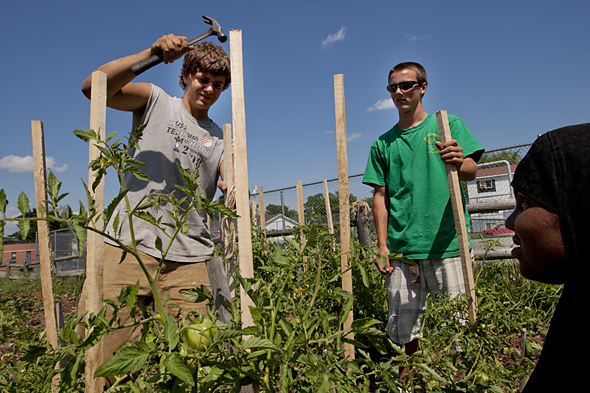director, harward center for community partnerships
bates college (2005-2010)
Social justice and public service have been part of the DNA of Bates College since its origins in the 1850s. Reformers founded the college on the ideals of coeducation, racial inclusion, and training "teachers and preachers" to better society. In the 1990s, President Don Harward renewed this tradition with strong commitments to service learning and engagement with the college's home community of Lewiston-Auburn, Maine. On his retirement, Bates launched the Harward Center For Community Partnerships in 2005; I served as Director until 2010.
The Center was blessed from the start with extraordinary staff, broad faculty support for engaged learning and public scholarship, a staunch champion in Dean Jill Reich, and students hungry to connect their studies with community and civic life. As the name suggests, it was rooted in an ethic of collaboration between campus and community and a goal of fostering civic engagement across the Bates experience. With the Center's support, most undergraduates incorporated community work into their studies or co-curricular activities; the majority of academic majors incorporated community-based coursework and research into their curricula. The Center offered grant funding to students, faculty, academic programs, and community partners for a wide range of social-service, cultural, environmental, and other projects.
Beyond sheer numbers of participants and projects, the Center sought to encourage deep, sustained, effective public engagement. It launched a series of long-term "collaboratories" with the public schools, cultural institutions, social agencies, immigrant and neighborhood organizations, and other partners. Such public work was meant to benefit not only community life but also student learning and personal growth. The Center sponsored a Community-Engaged Research Fellowship and a robust peer-leadership program through which undergraduates designed and led all co-curricular volunteerism.
The Center learned from, and contributed to, the national movement for academic civic engagement, especially the asset-based model of community partnership that was coming to supplant older notions of charitable service. Bates became (and still is) active in many national associations for academic engagement, including the Bonner Network, Project Pericles, and Imagining America. In 2007, the college was among the first institutions to be awarded the Carnegie Classification for Community Engagement.
For me personally, leading the Harward Center was an extraordinary experience. The Wood Street office was a place of joy, energy, and fellowship; I learned much from my colleagues, as well as my mentor and friend, Dean Jill Reich. I was active in several of the Center's projects, described in the Past Projects section. These included "Weaving a World," a public-history exhibition about the history of Lewiston millworkers; "Social Fabric," an art installation; Bates' long-term partnership with Museum L-A, a community-based history museum; and the Downtown Education Collaborative (DEC), a joint venture of seven local colleges and community organizations that opened a storefront education center serving Lewiston's immigrant and low-income residents.
In 2010, I left the Harward Center for Community Partnerships and Bates College for The New School, where I had the opportunity to serve as inaugural dean of an experimental college, The New School For Public Engagement. Professor Georgia Nigro, one of Bates' most distinguished public scholars and teachers, served as interim Director. She was succeeded by Darby Ray, under whose leadership the Harward Center has continued to deepen and expand the college's commitment to engaged learning.
Click here to read annual reports describing the work of the Harward Center, both during and since my tenure as Director.
Return to Leadership.


